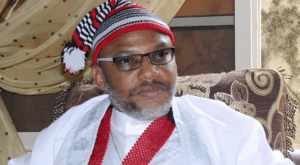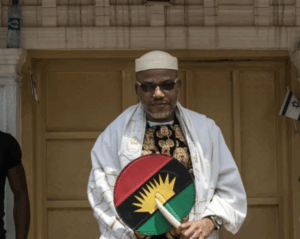A Nigerian federal court has found separatist leader Nnamdi Kanu guilty of terrorism and several other charges, concluding a dramatic legal battle that has stretched for more than a decade. Justice James Omotosho delivered the ruling in Abuja, sentencing Kanu to four life terms, along with additional sentences to run concurrently.

The prosecution had pushed for the death penalty, but the judge dismissed the request, noting that executions are now “frowned upon” and no longer favoured in Nigeria’s justice system.
Court: Broadcasts Incited Violence
In his judgment, Justice Omotosho stated that he was satisfied that Kanu made a series of broadcasts that incited violence, killings, and unrest, all in support of his campaign for an independent state in Nigeria’s south-east, known as Biafra.
Kanu was convicted on all seven charges, which included:
-
Terrorism
-
Treason
-
Membership in an outlawed group
-
Actions aimed at destabilising the Nigerian state
The court described the evidence presented against him as “incontrovertible,” and criticised Kanu for refusing to defend himself after dismissing his legal team earlier in the proceedings.
Kanu Removed from Court Before Verdict
Kanu was not present when the verdict was read. He had been forcibly removed from the courtroom for what authorities described as unruly behaviour.
Before his removal, he insisted that proceedings could not continue, claiming that he had not submitted his final written address and accusing the judge of bias.
Security was heightened around the courthouse in Abuja amid fears of potential protests from his supporters. However, reaction from his home region in south-eastern Nigeria has remained relatively calm.

From Radio Host to Separatist Leader
Nnamdi Kanu’s rise began in 2009 when he launched Radio Biafra, a London-based broadcast station calling for the independence of the Igbo people.
Although he grew up in south-eastern Nigeria and attended the University of Nsukka, Kanu moved to the UK before completing his studies and later obtained British citizenship.
In 2014, he founded the Indigenous People of Biafra (IPOB), a movement demanding secession. IPOB was officially designated a terrorist organisation by the Nigerian government in 2017. Its armed wing, the Eastern Security Network, has been linked to violent attacks in the region in recent years.
Long History of Arrests, Bail, and Re-Arrest
Kanu’s complicated legal journey includes:
-
2015: First arrested on terrorism-related charges
-
2017: Granted bail, later fled after a military raid on his home
-
2019: Bail formally revoked
-
2021: Reportedly re-arrested abroad and returned to Nigeria—a move his lawyers claim was a forced rendition from Kenya
-
2022: Appeal court rules charges should be dismissed due to illegal arrest
-
2023: Supreme Court overturns the decision and reinstates charges
The current verdict follows years of debate, diplomatic discussions, and legal manoeuvres.
Historical Context of Biafra
The push for Biafran independence dates back to 1967, when Igbo leaders declared a breakaway state. The resulting civil war, which lasted nearly three years, claimed up to one million lives, mostly from starvation.
While many Igbo people still express frustration and feelings of marginalisation, it remains unclear how many support full independence today.
What Happens Next?
Kanu’s legal team is expected to file new appeals. Meanwhile, analysts say the ruling may further strain relations between the federal government and communities in the south-east.
For now, the Nigerian government has not released an extended statement on the verdict, and it is uncertain whether this conviction will calm or intensify separatist sentiments in the region.




